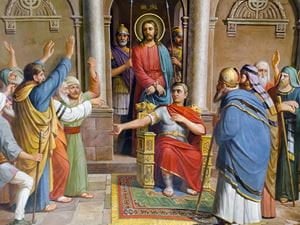
Christianity is roughly 2,000 years old, but the exact age of the religion is debatable. The current date system used by most of the modern world, the Gregorian calendar, was introduced by Pope Gregory XIII in October of 1582. This calendar is commonly used today to estimate exactly how long it has been since Jesus’ time and, thus, since the beginning of Christianity.
The Gregorian calendar starts with AD 1 as the year in which Jesus Christ was conceived and born. Christianity, however, did not suddenly spring into being as a fully formed religion in a stable in Bethlehem. In fact, it did not exist as its own religion for many years after Jesus’ birth. This is in part because Christianity is defined not primarily by the birth of Jesus but by his death and resurrection. These are the key elements that separate Christianity from the other Abrahamic religions. Neither Muslims nor Jews believe that Jesus Christ was the Son of God who was crucified, buried, and resurrected on the third day, what we now know as Easter.
Given that the resurrection of Christ is the most important moment in Christianity, there could be no Christianity before that first Easter Sunday. As such, Christianity is at least 30 years younger than the current Gregorian calendar year. In 1930, Christianity would be no older than 1,900 years old. This, of course, is a generous measure in several ways. First, the actual date of Jesus’ birth is unknown. Most scholars agree that Jesus was not born on December 25 in the year AD 1 but a few years before that. He was also likely over 30 when he died. Again, no one knows for certain how old Jesus was when he was crucified, but most estimates put him somewhere in his early thirties. This all makes it impossible to give an absolute start date to Christianity.
The earliest Christians were simply a splinter group of Jews. The years immediately following Christ’s death and resurrection were filled with growing pains for what would later become Christianity. Many of the tenets and practices that Christians today take for granted had either not yet been created or were still being debated. Jewish practices, such as male circumcision and the Jewish purity code, were still practiced by early Christians for some time. The doctrine of the Trinity—the uniquely Christian expression of belief in God as Father, Son (incarnate in Jesus Christ), and Holy Spirit—was standard Christian belief by the second century and most scholars agree that Christianity was its own religion by then.
Read more about the origins of Christianity here.
3/23/2021 6:32:41 PM








